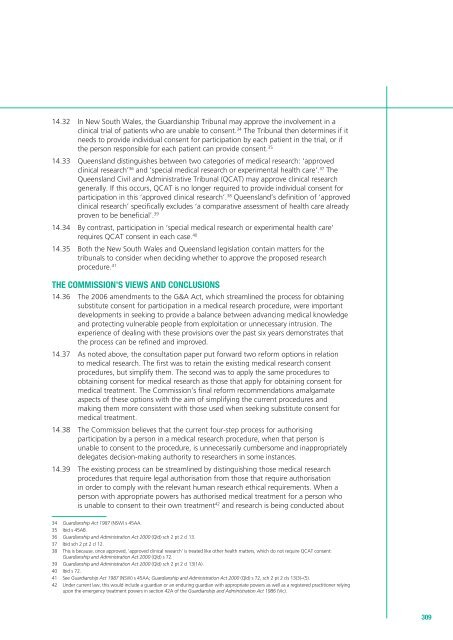Medical research - Victorian Law Reform Commission
Medical research - Victorian Law Reform Commission
Medical research - Victorian Law Reform Commission
You also want an ePaper? Increase the reach of your titles
YUMPU automatically turns print PDFs into web optimized ePapers that Google loves.
14.32 In New South Wales, the Guardianship Tribunal may approve the involvement in a<br />
clinical trial of patients who are unable to consent. 34 The Tribunal then determines if it<br />
needs to provide individual consent for participation by each patient in the trial, or if<br />
the person responsible for each patient can provide consent. 35<br />
14.33 Queensland distinguishes between two categories of medical <strong>research</strong>: ‘approved<br />
clinical <strong>research</strong>’ 36 and ‘special medical <strong>research</strong> or experimental health care’. 37 The<br />
Queensland Civil and Administrative Tribunal (QCAT) may approve clinical <strong>research</strong><br />
generally. If this occurs, QCAT is no longer required to provide individual consent for<br />
participation in this ‘approved clinical <strong>research</strong>’. 38 Queensland’s definition of ‘approved<br />
clinical <strong>research</strong>’ specifically excludes ‘a comparative assessment of health care already<br />
proven to be beneficial’. 39<br />
14.34 By contrast, participation in ‘special medical <strong>research</strong> or experimental health care’<br />
requires QCAT consent in each case. 40<br />
14.35 Both the New South Wales and Queensland legislation contain matters for the<br />
tribunals to consider when deciding whether to approve the proposed <strong>research</strong><br />
procedure. 41<br />
The <strong>Commission</strong>’s views and conclusions<br />
14.36 The 2006 amendments to the G&A Act, which streamlined the process for obtaining<br />
substitute consent for participation in a medical <strong>research</strong> procedure, were important<br />
developments in seeking to provide a balance between advancing medical knowledge<br />
and protecting vulnerable people from exploitation or unnecessary intrusion. The<br />
experience of dealing with these provisions over the past six years demonstrates that<br />
the process can be refined and improved.<br />
14.37 As noted above, the consultation paper put forward two reform options in relation<br />
to medical <strong>research</strong>. The first was to retain the existing medical <strong>research</strong> consent<br />
procedures, but simplify them. The second was to apply the same procedures to<br />
obtaining consent for medical <strong>research</strong> as those that apply for obtaining consent for<br />
medical treatment. The <strong>Commission</strong>’s final reform recommendations amalgamate<br />
aspects of these options with the aim of simplifying the current procedures and<br />
making them more consistent with those used when seeking substitute consent for<br />
medical treatment.<br />
14.38 The <strong>Commission</strong> believes that the current four-step process for authorising<br />
participation by a person in a medical <strong>research</strong> procedure, when that person is<br />
unable to consent to the procedure, is unnecessarily cumbersome and inappropriately<br />
delegates decision-making authority to <strong>research</strong>ers in some instances.<br />
14.39 The existing process can be streamlined by distinguishing those medical <strong>research</strong><br />
procedures that require legal authorisation from those that require authorisation<br />
in order to comply with the relevant human <strong>research</strong> ethical requirements. When a<br />
person with appropriate powers has authorised medical treatment for a person who<br />
is unable to consent to their own treatment 42 and <strong>research</strong> is being conducted about<br />
34 Guardianship Act 1987 (NSW) s 45AA.<br />
35 Ibid s 45AB.<br />
36 Guardianship and Administration Act 2000 (Qld) sch 2 pt 2 cl 13.<br />
37 Ibid sch 2 pt 2 cl 12.<br />
38 This is because, once approved, ‘approved clinical <strong>research</strong>’ is treated like other health matters, which do not require QCAT consent:<br />
Guardianship and Administration Act 2000 (Qld) s 72.<br />
39 Guardianship and Administration Act 2000 (Qld) sch 2 pt 2 cl 13(1A).<br />
40 Ibid s 72.<br />
41 See Guardianship Act 1987 (NSW) s 45AA; Guardianship and Administration Act 2000 (Qld) s 72, sch 2 pt 2 cls 13(3)–(5).<br />
42 Under current law, this would include a guardian or an enduring guardian with appropriate powers as well as a registered practitioner relying<br />
upon the emergency treatment powers in section 42A of the Guardianship and Administration Act 1986 (Vic).<br />
309
















